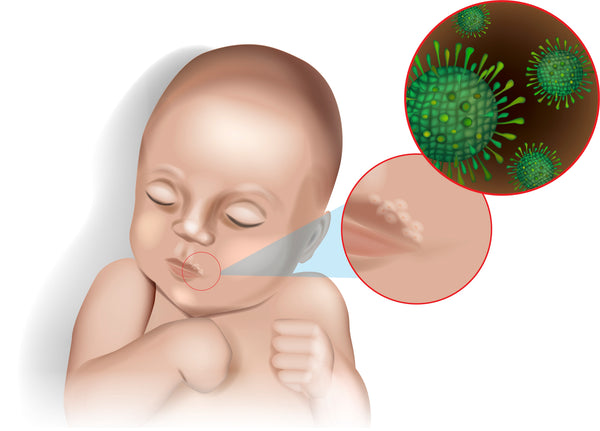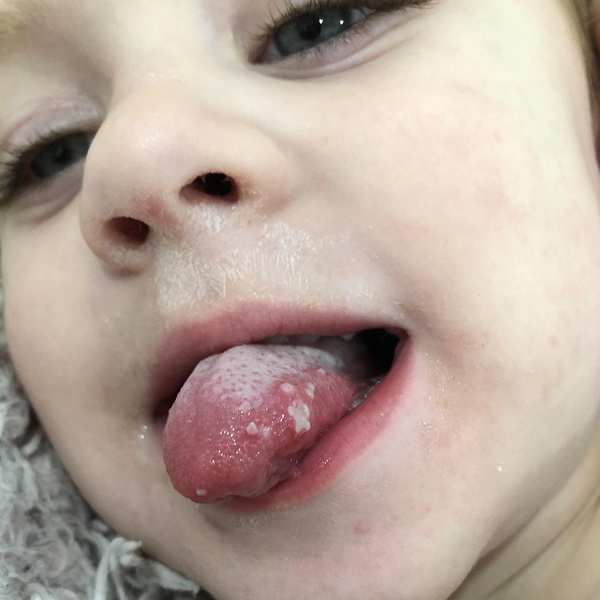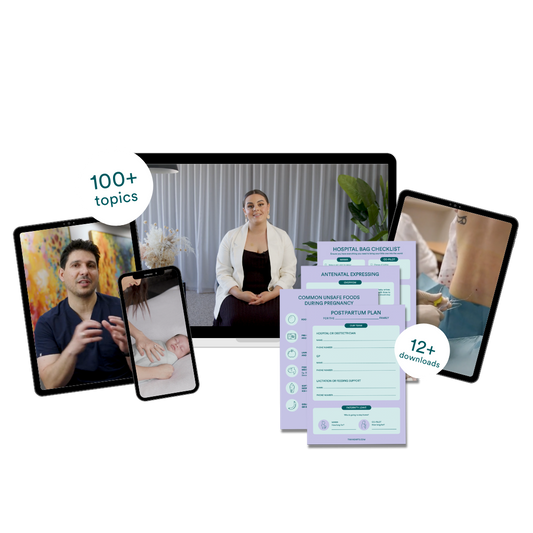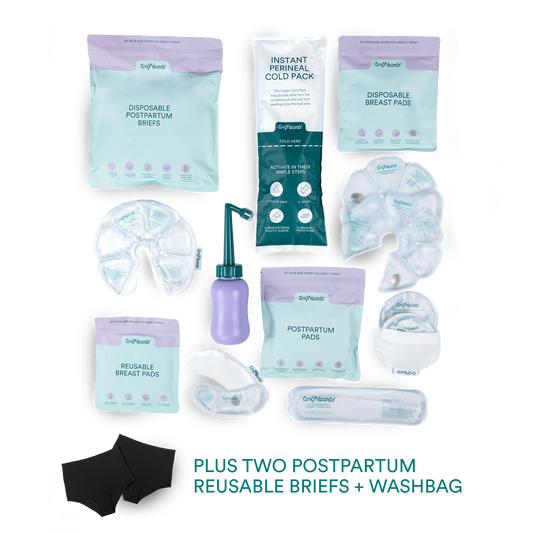After writing about my own experience as a mum when Nahla caught the cold sore virus, I had so many of you reach out with questions of concern for your own bubs. We know that, unfortunately, the seemingly innocent little cold sore caused by the Herpes Simplex Virus can cause severe illness and even death in babies under six months old. As a parent, we naturally want to do all we can to prevent this.
Why are cold sores so concerning? Firstly, we know that our little bubbas have not yet had the chance to develop a strong immune system like ours. It takes 2 – 3 months for a baby's immune system to mature, and this is even longer in premmie bub and those immunocompromised with other conditions. This incredibly vulnerable early stage for a newborn means one of the many jobs we have as parents is to stay on guard against viruses. Babies receive their first vaccinations at six weeks of age, but even after that, we've got to stay vigilant!

Unfortunately, once a person is infected with the herpes simplex virus; it's with them for life. The virus will sleep quietly in the body without causing symptoms; however, it may wake up again later if the body becomes stressed or run down.
The frightening fact we know about cold sores is that, in rare cases, it can cause a complication known as Herpes simplex encephalitis. This is a severe and life-threatening condition characterised by inflammation of the brain, causing brain damage and, in some cases, death. It may occur in conjunction with the cold sores themselves but is actually more likely to rear its head later on. As a paramedic, I'd heard about this horrible complication, and I know as a parent, it's particularly scary. It's important, however, to remain aware, not alarmed, remembering that informed parents are prepared parents!
This year, more than any other, we've all learnt about the importance of hygiene and virus prevention - so although this blog speaks to cold sores, we need to apply these practical tips across the board to keep our kiddies safe from all bugs!
How do I know my little one has the virus?

My Nahla was two when she contracted the virus from daycare. She became extremely unwell with raging fevers over 40 degrees and inconsolable irritability from the immense pain in her mouth. By the second day, ulcerated blisters had broken out on her tongue and gums. Eating and drinking were unbearable for her, which added worry about her risk of dehydration.
It was the worst, and she was 2 years old. I cant imagine how sick she would have been if she was only a little bub. Many children with cold sores will drool excessively, be unusually irritable and have a sore throat or swollen glands around their neck. Experts say that one in four kiddies will get mouth ulcers after their first viral infection, and the virus can stick around for up to two weeks. In most cases, though, the symptoms will go away on their own.
How are cold sores transmitted to babies?

It's important to note there is more than one strain of Herpes simplex virus. This blog post is focused on HSV-1 relating to oral cold sores rather than the sexually transmitted strain known as HSV-2. The World Health Organisation states that 67% of the global population carries HSV-1, yet most herpes infections are asymptomatic. 67%! That's huge, hey!? The herpes simplex virus within cold sores is transmitted through saliva. However, in around 10 out of every 100,000 births globally, babies catch the virus through exposure to HSV-2 in the mother's birth canal during delivery.
Most commonly, however, little ones get the virus from being kissed or touched by a person who carries the virus, by sharing drinks, utensils or towels, or by coming in contact with a cough or sneeze from an infected person. When we combine the knowledge about our bub's fragile immune systems with knowing that kissing babies can cause this horrible virus, it's clear to see why kissing young babies is certainly risky business!
My baby has eczema. What do cold sores mean for them? 
Another rare complication of the cold sore virus can occur in children who already have eczema. If the cold sore finds its way into the skin via open eczema lesions, it can develop into a condition known as Eczema Herpeticum. This nasty addition to your child's already troublesome skin condition usually occurs 5-10 days after your little one comes into contact with the virus. For parents of eczema kids, it's important to prevent your child from skin-to-skin contact with a known cold-sore carrier and teach your little ones not to share things that touch another person's mouth.
I get cold sores regularly myself. How can I avoid passing them on to my baby? 
After the exhaustion of birthing my first bubba Nahla, I actually had a cold sore myself! Nahla was in special care nursery, and I was extra aware of her tiny little body and its limited immunity. I made sure to always wash my hands thoroughly before touching her, and I wore a mask until that cold sore was gone. It's natural to want to kiss bubs, but if you've got a cold sore, it's really not worth the risk of serious complications. Particularly if you or your co-pilot get cold sores yourself, being aware of what to look out for in your newborn is key! If you must kiss your baby, the crown of their head is probably safest - avoid their face and hands (since these always end up in their mouth!)
Do I only need to worry about cold sores if the virus is currently active?
Unfortunately, because HSV lays dormant within our bodies after infection, it is possible to transmit the virus through saliva even if it's not currently active. Although it's most contagious when symptoms are present, it can definitely still be passed on when they're not. For this reason, we advise you to take precautions around hygiene regardless and apply our practical tips across the board – but most importantly, remembering this advice is most crucial for our little ones under 6 months because of their undeveloped immune systems and decreased ability to fight the bug off.
When should I take my child with cold sores to the Doctor?
- If your little one is under 6 months of age and gets a cold sore
- If they're immunocompromised
- If cold sores aren't healing within two weeks
- If your child also has eczema.
- If cold sores occur in conjunction with a headache/seizure or confusion.
- These are signs of encephalitis and need to be treated very seriously.
- If your child is getting frequent bouts of cold sores.
- If any sores break out near their eyes or their eyes become irritated.
How can I treat cold sores?
- Cold compresses can help with the pain and discomfort.
- Try a teething ring, a wet cloth for your little one to bite on, or a cold pack to put on the outside of the mouth.
- Keep up hydration with icy poles, cold drinks and foods.
- Your little one may find sipping through a straw more comfortable, and pureed foods may be easier.
- Pain relief, such as Paracetamol and Ibuprofen, can be helpful. Give as per the instructions on the bottle. Use a tracker to avoid medication overdoses.
- Be mindful of over-the-counter meds that contain local anaesthetics. Pharmacies may recommend these, but the ingredient Lidocaine can be harmful if too much is swallowed.
Is it still safe to breastfeed if I have a cold sore myself?
Mums with cold sores may transmit HSV to their bubbas by contact with the lesions, so it's important you get timely treatment to nip your infection in the bud! Most anti-viral treatments mums are given are safe whilst breastfeeding but check with a doctor. So long as breasts remain free of infection, breastfeeding is still to be encouraged. Being diligent with your hand hygiene is a top priority, and avoiding sharing spoons with bubs if they are onto solids is an absolute must.
At what age do cold sores become less dangerous for little ones?
There is no definitive answer to an age that rules out the risk altogether. This is because we are all born with and develop varying immunity levels, some of us more compromised than others. What's most important to remember is the vulnerability of our littlest loves. These are our bubbas under the age of 6 months and those already immunocompromised or challenged by prematurity.
What about antibodies? If I carry the virus, could this actually protect my baby?
We can never be sure exactly how much the body has built up immunity from exposure to others, so for this reason, it's best to play it safe. That being said, an interesting study in the US found that pregnant women who'd previously had the herpes simplex virus DID maintain active antibodies that COULD protect against neurological infections from HSV in their bubbas. Although I'd love to say this news means we can all breathe a sigh of relief, it's important we don't take it as gospel. I myself carried the virus whilst pregnant, yet Nahla still managed to contract it as a two-year-old.
How do I tell people not to kiss my baby without feeling awkward or rude?
Remember my 'go-to' advice, guys: Your baby, your rules! Grandparents will be over the moon about a baby, and it's a pretty natural reaction to want to cover your new addition in kisses. The key here is to remember that whilst this comes from a place of love, your baby's well-being needs to come first! In most cases, our broader community are just not yet armed with the right knowledge. Your job here, folks, is to empower them with information about why you've requested what you have, whatever that may be. When it comes to kissing your bub, I have little doubt that once they know the risks and dangers, they, too, will do everything they can to keep them safe. The trick is to be gentle in your approach but stay firm and stick to your guns. Explain this request won't last forever but just until they are older and their immunity is not so fragile.
If disagreements happen, remember it's not the end of the world, and you would hate to look back and wish you'd said something. Communication with family can be tricky to navigate, but you have a new little family unit of your own now, and as new parents, you've now got the final say! Take a deep breath, unite as a team with your co-pilot and remember, if others don't respect your wishes, that's their problem, not yours! You're amazing, and you've got this!
I hope this answers the burning questions you all have and gives you some information and tools to put in place to keep your most precious little one safe!
Love Nik xx








